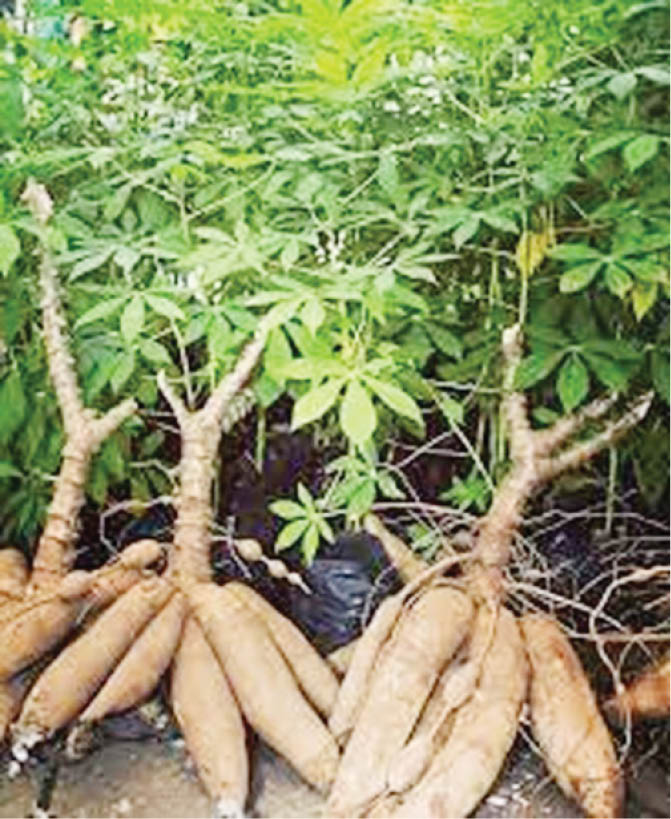Cassava farmers across the 23 local government areas of Benue State are currently not leaving any stone unturned in the new crave to boost production for income generation.
Our correspondent reports that the idea behind the leap in production followed the value of processing, which in recent times has continued to generate more income for the farmers than many other crops.
How Kano ostrich farmer manufactured 5000-capacity incubators
Henna: Farmers, marketers, artists highlight economic benefits
Also, the presence of two factories—a huge cassava processing plant located at the outskirts of Makurdi, the state capital and another in Ukum Local Government Area, both owned by Chinese nationals, have in no small measure contributed to the crave for cassava production.
While some farmers resident within the area of the factories now rely mostly on the plants as market for their cassava, others in faraway local government areas who claimed ignorance of the plants existence, have continued to process theirs into varied value chains for desired markets.
For these farmers, the government should do more of sensitisation about the presence of the plants, as they argued that the factories, though individually owned, existed by the permission of the state government.
A cassava farmer in the Otukpo area of the state, Aboje Sunday, opined that his investment in the tuber crop was yet to make any meaningful advancement.
Sunday said, “For now, there’s no positive impact. And this is hugely as a result of low sensitisation. In spite of the plant, most cassava farmers still process their produce into garri and akpu. They are not aware of the plant, and it appears the public relations/marketing department has not done enough to sensitise the farmers on the benefit inherent in selling their produce to them. Unless the right thing is done, cassava farmers will get the desired benefit for their effort.”
But a big cassava farmer in Otukpo, Ediga Akpa, noted that his investment had been the most rewarding experience since he started effectively five years ago.
“My first cultivation covered three hectares, and over the years, I have been able to increase my coverage. As we speak, I have over 20 hectares of cassava farm this farming season. I am not only into cultivation but also in to processing.
“We have a garri/animal feed processing factory located on one of my farms, with an installed capacity of over a metric ton daily. We produce garri for sale, we process at a cost for farmers. We also produce animal feeds from cassava and cassava peels. In addition to the above, we also produce cassava starch, albeit in low quantity.
“In the cassava value chain, the activities are many and quite labour-intensive, and as a result, we engage a large number of hands on a daily basis. On the average, we engage over 100 hands on a daily basis during our peak period. This involves both skilled and unskilled hands. This way, we provide employment to our teeming youths and others; hence empowering them and impacting on the local economy. This is a source of huge sense of fulfillment to us.
“In addition to the above, our return on investment is growing by the day. The profit has been encouraging, through which we have been able to invest in the infrastructure base of the organisation and the expansion of our activities. We have been partnering with various organisations to offer on-hand training to various youth organisations in the locality that are involved in the various stages of the cassava value chain. This has greatly impacted on the holding capacity of the locals.
“The presence of the ethanol plant in Makurdi is also changing the face of cassava business in Benue State. In a short while from now, there will be a huge shortfall in the availability of cassava for our factory since the total regional output of cassava cannot service both the plant and the various cottage garri processing industries. This will certainly affect our productivity, and invariably, our profitability. However what we lose as competitors to the ethanol plant we gain as cassava growers since demand outstrips supply, thereby increasing the price of the tonnage of cassava,” Akpa said.
On his part, Jonah Iorundu, a farmer in Daudu community of Guma Local Government Area, a closer proximity to the location of the ethanol plant on the outskirts of Makurdi, said the cassava plant had been beneficial to farmers because of its many processing components encompassing every part of the cassava, such as the leaf, stem and tubers.
“Farmers are making money from their cassava. I usually process my cassava into garri for commercialisation. Sometimes sell to those who process the cassava into akpu, as well as sell the stems for income. Fifty stems of cassava are sold at N1,500. So I make money from cassava in many ways.
“The ethanol plant pays N1.1million for a full loaded truck of cassava after taking measurements of its weight, so we are making money from it. I have only made one transaction to the plant; a half loaded truck of cassava, which earned me N500,000,” he added.
Similarly, the state chairman of the All Farmers Association of Nigeria (AFAN), Aondongu Saaku, admitted that cassava processing into varieties such as akpu or elubo, starch, flour or ethanol, among others, had gained ground and income for farmers in the state.
Saaku said it was the reason the AFAN now encourages farmers to go into more production although sometimes the prices go down.
“We advise farmers to produce garri, which can be stored for even two years to avoid losses. In the aspect of processing, the cassava is used more for garri. Very few people have started processing starch for industrial use. When it comes to dry season, it is processed into flour.
“Actually, the Central Bank of Nigeria (CBN) has now come out for the establishment of cottage processing of cassava. And we are obliging farmers to key in for their own collateral and get the facility. The more we have the facilities, the better for farmers in the state because we normally have the market. Once there is a ready market, the farmers would have no problems.
“The plant near Makurdi has added to farmers’ income in the state, and that’s why cassava is no more as cheap as it used to be because people are now supplying to the factory. Even at that, one factory is not enough; it breeds monopoly, just as the services are slow and payment not commensurate with the production rate,” he maintained.
Meanwhile, the Director of Agric Science at the Ministry of Agriculture and Natural Resources, Thomas Unongo, explained that no single aspect would be wasted as people make use of the leaves for vegetable. He said that even what used to be regarded as cassava waste are now being turned to wealth.
Unongo said government’s investment in the processing of cassava had been impressive and yielding positive results for farmers.
“It is very impressive. There is reduced wastage of cassava tubers through post-harvest losses and increased income to cassava farmers. Nothing is wasted in cassava. Even the bark goes into feed production,” he said.
In July this year, the state government distributed high-yielding 11,000 bundles of cassava stems, among other seeds, to rural farmers.
Governor Samuel Ortom who flagged off the 2022 cropping season with the distribution of the improved seeds to the 23 local government areas in the state for rural farmers, emphasised the need for the people of the state to key into the programme, maintaining that it has added economic value towards boosting the agriculture sub-sector for food security.
In the thinking of a university don, Professor Terhemba Shija, more is still to come for the Benue cassava. Shija recently posited that cassava production in Benue State ranked highest in the country despite being mostly handled by peasant farmers who use hoes and cutlasses instead of modern tools.
He said the farmers were boosting cassava production in the country, even in the face of low capitalization, and subsequently, low yield per hectare.
Quoting statistics by the National Bureau of Statistics (NBS), Shija said that in spite of the odds against the farmers, the strength of the economy of Benue State could be derived from agriculture.
“In spite of that, Benue State is still the country’s leading producer of cassava, yam, soya beans and citrus. It is also a major grower of beniseed, groundnut and melon.
“The viability of Benue State in crop production can be attested to, even in the 2019 NBS data on cassava production, in which the state came first among the 36 states with 3.54 million metric tonnes, as well as first in the citrus, with about 3.84 metric tonnes,” he said.

 Join Daily Trust WhatsApp Community For Quick Access To News and Happenings Around You.
Join Daily Trust WhatsApp Community For Quick Access To News and Happenings Around You.


